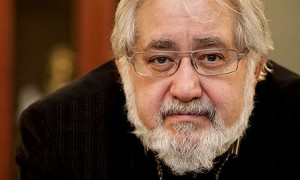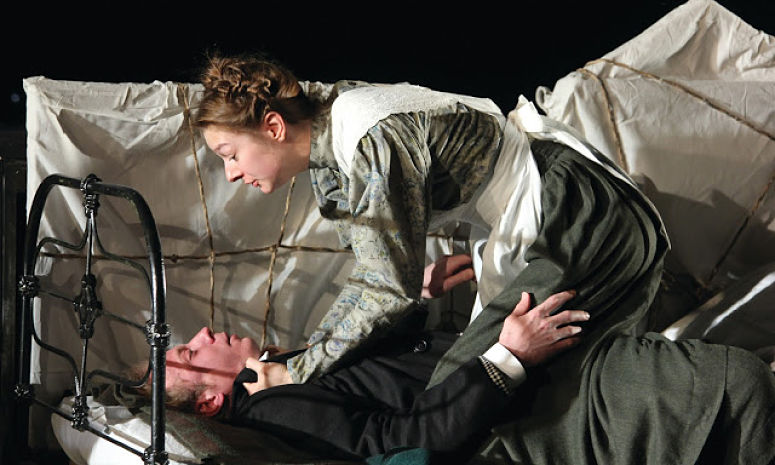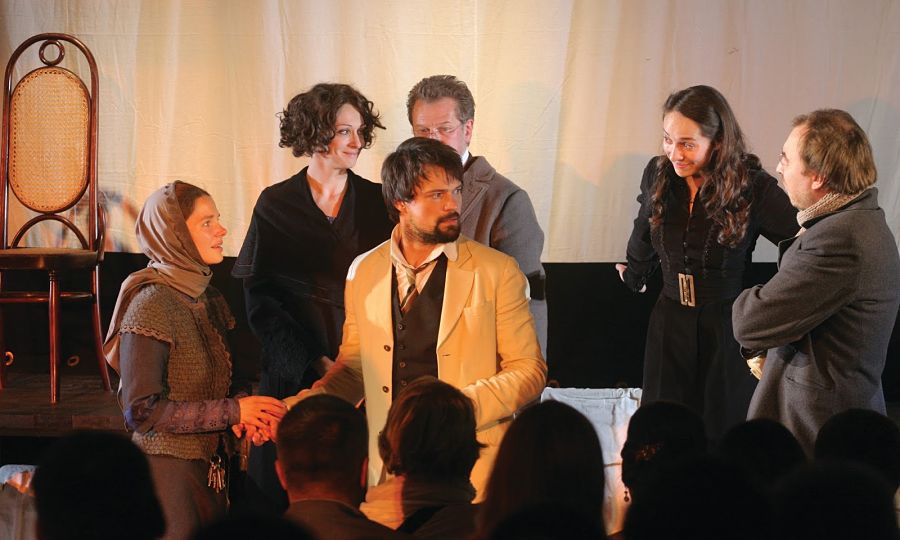Every generation brings a new director to the world stage who changes the way we experience the classics, whether it be Sophocles, Shakespeare, or Molière.
With regard to Anton Chekhov, that accolade belongs to Lev Dodin, artistic director of the Maly Drama Theatre of St. Petersburg, Russia since 1975. His bold, brilliant interpretations have given the world the unique opportunity to see Chekhov’s beautiful, elusive works in a new light—as if for the very first time.
Dodin has toured the world with his celebrated company, performing Chekhov’s plays to rapturous audiences. In 2007, he dazzled London with the rarely performed Platonov at the Barbican Theatre, featuring a full swimming pool. (“After that, everyone started putting pools onstage,” Dodin laughs.) His affecting Uncle Vanya was performed at the Brooklyn Academy of Music in 2010 by a passionate ensemble that plumbed the play’s emotional fathoms deeper than I’d ever seen. In his haunting Three Sisters (also at BAM, in 2012), the hopeless characters sat in the windows of their house like doomed prisoners while the façade drew closer and closer to a spellbound audience.

This winter Dodin returns to BAM’s Harvey Theatre with a thrilling production of The Cherry Orchard, Chekhov’s final play. He wrote it while struggling with a terminal illness, dying just six months after it premiered at the Moscow Art Theatre at the age of 44. In it, Chekhov prophesized the twilight of the Russian landed gentry (represented by Ranevskaya) and the emergence of a new order (Lopakhin, capitalist and former serf). It was his greatest vision—of a dying culture as seen through the eyes of a dying man. A year after his death, Russia felt the shock wave of its first revolution.
As a Chekhov translator and biographer, I’ve seen many productions of this play over the years—in London, Paris, Prague, and Moscow, to name only a few places—but none has had the impact of Dodin’s stunning rendition. His production is so alive and immediate, from its unconventional mise en scène to the use of the entire Harvey space, from the passionate ensemble to the delicate balance of comedy and tragedy—all give the illusion of “life as it is,” as Chekhov put it. Moreover, Dodin’s daring cuts in the text, rearrangement of scenes, and startling updates don’t detract from Chekhov’s original intent—on the contrary, they enhance it, thanks to Dodin’s profound insights.
I sat down with Dodin, who’s now 71, after the show’s Brooklyn opening to hear about the inspiration for this stunning production. A tempting raspberry tart lay on the table before us—and though it’s his favorite, he was too engrossed in conversation to touch it.
CAROL ROCAMORA: What is your history with The Cherry Orchard?
LEV DODIN: I’ve directed the play once before at the Maly, in 1995. It toured to the Odeon in Paris. It was a different world then; we had a premonition of something new coming, but we thought we could handle whatever it would be. But then, when we started working on the play again a year and a half ago, we realized that the new things coming our way today are far more frightening than those that came before. I don’t mean only in Russia—I think the world has become ill from these terrible things.
Is that what inspired you to return to the play?
The amazing strength of Chekhov is that when he wrote this play he saw these great changes coming. It’s Chekhov’s most historical play. It took him three years to write, longer than any others, and in it he predicts everything that happens for the next century.
Aleksander Borovsky’s set is spare, with only a few pieces of furniture placed randomly on the stage edge and the auditorium floor. Instead, you use the entire Harvey Theatre as a playing space. Your actors move up and down the aisles, reciting their lines; they sit alongside audience members in the first row and in the aisles. Since you’re on tour to Moscow, Paris, and Amsterdam as well as New York, how do you redirect the play for each auditorium?
I remind my actors that the entire theatre is the estate that we’re going to sell and lose. Each time we move, we lose our home and must find a new one. In the Harvey, you feel you’re in a crumbling estate, just like the one Chekhov imagined.
The cherry orchard is one of the most famous symbols in all of dramatic literature. How did you arrive at your inspired choice of how to depict it?
It’s one of the artistic challenges of doing the play. I wanted my actors to have what Stanislavsky calls a “real vision” so that they in turn can transfer it to the hearts and minds of the audience. In preparation for our production in 1995, we searched all over Russia and couldn’t find a single remaining cherry orchard—not of the size and grandeur of Chekhov’s times! So this time around, we started looking in Europe, where we found that the trees aren’t tall, because they’re farmed for commercial usage. Finally, in Hamburg, we found an ancient orchard where the trees were 150 years old and 8 meters high. The old German farmer and owner said, “This was my grandfather’s and my father’s before me. When I die, they can chop it down.” It sounded like a line from the play. So we rehearsed there and filmed it. Then my designer strung up a white curtain across the stage and we projected “home films” that represented those the Ranevskayas took of their cherry orchard in happier times.
You made some bold changes in Chekhov’s text. For example, you begin the play with the very last line that Firs, the ancient servant, utters before the end.
[Laughing] I know! I felt that that was the only way. We tried it as Chekhov wrote it, and I always felt it was too expository. Then in the middle of rehearsals, I had an emergency quadruple bypass operation. When I returned to work, I realized we needed something weightier to start the show, and that the play had to start with Firs, the former serf and ancient servant whom the family leaves behind, forgotten. It’s a play about mortality. A way of life, serfdom, is over before the play starts, and another way of life, the estate, is over by the play’s end. It’s also a play about slavery and freedom. Yes, the serfs have been freed, and yes, the Ranevskayas of the world have tried to atone for the past, but the final occupant of the estate at the end, Firs, still considers himself a serf. So you can never get enough fresh air into that house to rid it of the spirit of slavery. We think we change the world, refute the past, become different people—but the past always catches up to us. I’m speaking not only of Russia, but also of the world today.

What about the moment when Lopakhin and Varya share a passionate kiss—and then run offstage for an implied tryst. That’s not in the original…
I wanted to find a contemporary reality to their relationship. Varya, the family’s adopted daughter, is usually played as a meek housekeeper with an inferiority complex. But I think she’s a great source of passion and sensuality.
There are moments in your production when you make startling, modern choices—as when, during Lopakhin’s exultant dance in Act III, he bursts into a rendition of “My Way.”
[Laughing] It’s fascinating to me that American audiences think it’s a gimmick. Lopakhin is actually very sincere at that moment. We came up with the idea that if the nouveau riche Russians today were at a party and got drunk, they would sing “My Way.” If you listen carefully to the lyrics, you’ll find it’s almost word for word what Lopakhin says in Chekhov’s text.
And your modern choice for the “breaking string,” the famous sound cue that occurs twice in the text, symbolizing the break between the old and new order
That’s intentional. It’s the sound of a siren, meant to evoke images of the gulag prisons or concentration camps to come.
For me, your production perfectly balances the play’s tragedy and comedy. How did you arrive at it?
Chekhov was striving to write a comedy, in spite of being mortally ill. He intended to write a vaudeville and ended up writing a tragedy. Chekhov himself didn’t fully realize that the funnier the play is, the more tragic, and vice versa. As such, he is the forerunner of the theatre of the absurd. In the end, Chekhov is a genius of proportion. My actors and I are surprised by how much more American audiences laugh at this production than Russian audiences do. I think it’s because in Russia we’re trained to take the classics seriously. In the end, with Chekhov, I think it’s the laughter of recognition.
What about your final stunning vision in the play?
The play may be about a struggle between the Ranevskayas and the Lopakhins in Russia, but then 14 years go by and in 1917 a third power emerges and annihilates them both. So I imagined that all the characters in the play would be taken out into the snow and shot. For me, the biggest discovery is that all the characters in this play are moving toward the same inevitable tragic destiny and that there’s no way out.
What did you discover in Chekhov this time around?
Every time I watch a performance, I realize that every word and line has far more meaning under it than we thought. And I appreciate the wealth of meaning anew. We could continue rehearsing, on and on. Great literature is bottomless. Like life, it’s unknowable.


